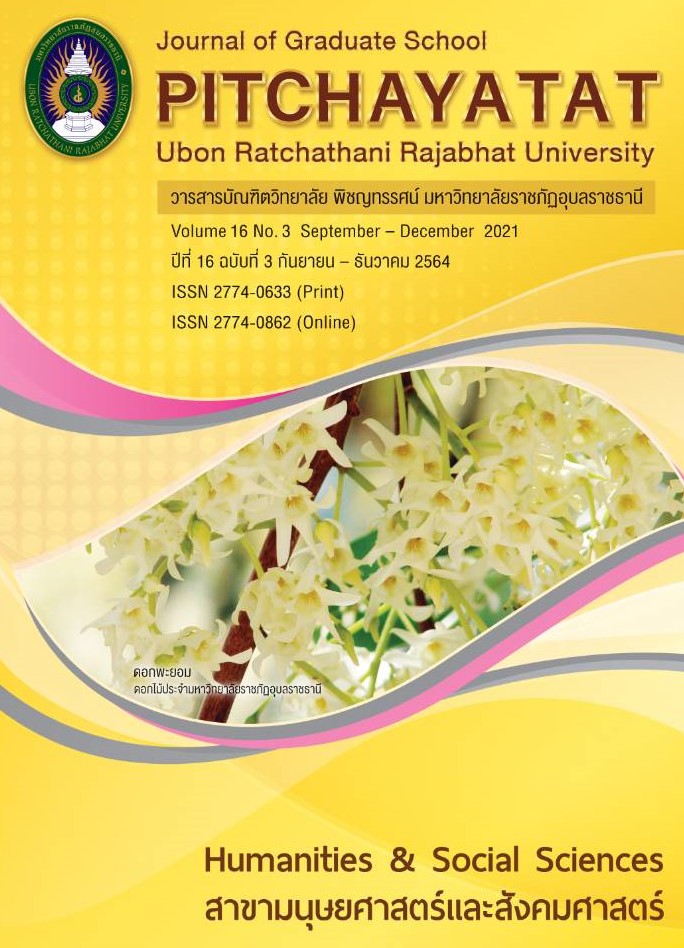ประสิทธิผลของโปรแกรมการส่งเสริมสุขภาวะเด็กก่อนวัยเรียนในศูนย์พัฒนาเด็กเล็ก ขององค์การบริหารส่วนตำบลในเขตอำเภอมหาชนะชัย จังหวัดยโสธร
คำสำคัญ:
การส่งเสริมสุขภาวะ, เด็กก่อนวัยเรียนบทคัดย่อ
การวิจัยนี้มีวัตถุประสงค์เพื่อศึกษาประสิทธิผลของโปรแกรมการส่งเสริมสุขภาวะเด็กก่อนวัยเรียนในศูนย์พัฒนาเด็กเล็กขององค์การบริหารส่วนตำบลในอำเภอมหาชนะชัย จังหวัดยโสธร ใช้รูปแบบการดำเนินงานการวิจัยกึ่งทดลอง แบบสองกลุ่มวัดผลก่อนและหลังการทดลอง ตัวอย่างที่ใช้ในการวิจัย คือ เด็กก่อนวัยเรียนในศูนย์พัฒนาเด็กเล็กขององค์การบริหารส่วนตำบลในเขตอำเภอมหาชนะชัย จังหวัดยโสธร ปีการศึกษา 2564 จำนวน 64 คน ได้มาโดยการสุ่มตัวอย่างแบบแบ่งชั้นภูมิ และใช้วิธีสุ่มตัวอย่างแบบง่าย ในการกำหนดกลุ่มทดลอง และกลุ่มควบคุม แบ่งเป็นกลุ่มควบคุม 32 คนกลุ่มทดลอง 32 คน โปรแกรมการส่งเสริมสุขภาวะเด็กก่อนวัยเรียนที่ใช้ในการวิจัยประกอบด้วยการส่งเสริมสุขภาวะ 4 ด้าน ได้แก่ ด้านร่างกาย ด้านอารมณ์ – จิตใจ ด้านสังคม และด้านสติปัญญา โดยประยุกต์ใช้ทฤษฎีการเรียนรู้ของบรูเนอร์ ทฤษฎีการเรียนรู้จากตัวแบบของแบนดูรา และทฤษฏีแรงสนับสนุนทางสังคม การทดลองใช้ระยะเวลา 3 เดือน เก็บรวบรวมข้อมูลก่อนและหลังการเข้าร่วมโปรแกรมโดยใช้แบบประเมินสุขอนามัยเด็กก่อนวัยเรียน แบบสังเกตพฤติกรรมส่งเสริมสุขภาวะเด็กก่อนวัยเรียน ซึ่งหาค่าสัมประสิทธิ์อัลฟา ตามวิธีการของ Cronbach’s Alpha Coefficient และแบบทดสอบความรู้การส่งเสริมสุขภาวะเด็กก่อนวัยเรียน วิเคราะห์ข้อมูลโดยการหาค่าเฉลี่ย ร้อยละ ส่วนเบี่ยงเบนมาตรฐาน และการทดสอบที
ผลการวิจัยพบว่า
- เด็กก่อนวัยเรียนกลุ่มที่ได้รับโปรแกรมส่งเสริมสุขภาวะเด็กก่อนวัยเรียนมีค่าเฉลี่ยคะแนนสุขอนามัย ความรู้ และพฤติกรรมการส่งเสริมสุขภาวะเด็กก่อนวัยเรียนหลังการทดลองสูงกว่าก่อนทดลองอย่างมีนัยสำคัญทางสถิติ
- ค่าเฉลี่ยคะแนนสุขอนามัย ความรู้ และพฤติกรรมการส่งเสริมสุขภาวะเด็กก่อนวัยเรียนกลุ่มที่ได้รับโปรแกรมส่งเสริมสุขภาวะเด็กก่อนวัยเรียนสูงกว่าเด็กก่อนวัยเรียนกลุ่มที่ไม่ได้รับโปรแกรมส่งเสริมสุขภาวะเด็กก่อนวัยเรียนอย่างมีนัยสำคัญทางสถิติ
เอกสารอ้างอิง
คณะกรรมการกฤษฎีกา, สำนักงาน. พระราชบัญญัติสภาตำบลและองค์การบริหารส่วนตำบล. กรุงเทพฯ: สำนักงานคณะกรรมการกฤษฎีกา, 2537.
ณัฐทิญาภรณ์ การะเกตุ. “การพัฒนาพฤติกรรมทางสังคมของเด็กปฐมวัยโดยใช้กิจกรรมศิลปะสร้างสรรค์,” Journal of Modern Learning Development. 5, 2 (มีนาคม-เมษายน 2563): 40.
ทัดตา สุภากูลย์. การพัฒนารูปแบบการส่งเสริมพฤติกรรมสุขภาพสำหรับเด็กนักเรียนโรงเรียนตำรวจตระเวนชายแดนในพื้นที่ทุรกันดาร อำเภอสังขละบุรี จังหวัดกาญจนบุรี. วิทยานิพนธ์สาธารณสุขศาสตรดุษฎีบัณฑิต สาขาการส่งเสริมสุขภาพ มหาวิทยาลัยเกริก, 2561.
นภเนตร ธรรมบวร. หลักสูตรเพื่อพัฒนาเด็กปฐมวัยในประมวลสาระชุดวิชาการจัดประสบการณ์สำหรับเด็กปฐมวัย หน่วยที่ 3. นนทบุรี: สำนักพิมพ์มหาวิทยาลัยสุโขทัยธรรมาธิราช, 2549.
ยุภารัตน์ ทุมแก้ว. “ผลของโปรแกรมทันตสุขศึกษาเพื่อปรับเปลี่ยนพฤติกรรมในการป้องกันโรคเหงือกอักเสบของ นักเรียนชั้นประถมศึกษาปีที่ 6 โรงเรียนประถมศึกษาอำเภอเวียงเก่า จังหวัดขอนแก่น,” ทันตาภิบาล. 29, 1 (1 มกราคม – มิถุนายน 2561): 38.
ราชวิทยาลัยกุมารแพทย์แห่งประเทศไทย และสมาคมกุมารแพทย์แห่งประเทศไทย. คู่มือสำหรับพ่อแม่เพื่อเผยแพร่ความรู้ด้านการดูแลและพัฒนาเด็ก ตอน เด็กวัยอนุบาล 3-6 ปี. กรุงเทพฯ: ราชวิทยาลัยกุมารแพทย์แห่งประเทศไทย สมาคมกุมารแพทย์แห่งประเทศไทย, 2560.
โรคติดต่อทั่วไป, สำนัก. คู่มือการประเมินศูนย์เด็กเล็กปลอดโรค. นนทบุรี: ชุมนุมสหกรณ์การเกษตรแห่งประเทศไทย, 2554.
โรงพยาบาลมหาชนะชัย. การส่งเสริมพัฒนาการเด็กปฐมวัยอำเภอมหาชนะชัย. เอกสารประกอบการประชุมติดตามการดำเนินงานกองทุนหลักประกันสุขภาพท้องถิ่น อำเภอมหาชนะชัย จังหวัดยโสธร; 19 มิถุนายน 2563; องค์การบริหารส่วนตำบลคูเมือง, ยโสธร.
โรงพยาบาลส่งเสริมสุขภาพตำบลบ้านเหมือด. JHCIS. รายงาน 506. โรงพยาบาลส่งเสริมสุขภาพตำบลบ้านเหมือด, 2563.
วัลธนี ยังแหยม. การส่งเสริมสุขอนามัยในเด็กปฐมวัยในศูนย์พัฒนาเด็กเล็กบ้านหนอง เทศบาลตำบลตลุก โดย ใช้กิจกรรมการเล่านิทาน. วิทยานิพนธ์ศึกษาศาสตร์ สาขาการศึกษาปฐมวัย มหาวิทยาลัยสวนดุสิต, 2560.
วิชัย เอกพลากร และคณะ. รายงานการสำรวจสุขภาพประชาชนไทยโดยการตรวจร่างกาย ครั้งที่ 5 พ.ศ. 2557. นนทบุรี: สถาบันวิจัยระบบสาธารณสุข, 2557.
สรงค์กฏณ์ ดวงคำสวัสดิ์. การประยุกต์กระบวนการกลุ่มและให้แรงสนับสนุนจากอาสาสมัครสาธารณสุขประจำหมู่บ้าน เพื่อปรับเปลี่ยนพฤติกรรมการป้องกันโรคไข้เลือดออกของแม่บ้าน อำเภอแม่ทะ จังหวัดลำปาง. วิทยานิพนธ์วิทยาศาสตรมหาบัณฑิต มหาวิทยาลัยวลัยลักษณ์, 2539.
สาธารณสุข, กระทรวง. คู่มือเฝ้าระวังและส่งเสริมพัฒนาการเด็กปฐมวัย. กรุงเทพฯ: องค์การสงเคราะห์ทหารผ่านศึก, 2560.
สาธารณสุขจังหวัดยโสธร, สำนักงาน. รายงานประจำปี 2562 ของสำนักงานสาธารณสุขจังหวัดยโสธร. ยโสธร: สำนักงานสาธารณสุขจังหวัดยโสธร, 2562.
สาธารณสุขจังหวัดยโสธร, สำนักงาน. รายงานประจำปี 2560 ของสำนักงานสาธารณสุขจังหวัดยโสธร. ยโสธร: สำนักงานสาธารณสุขจังหวัดยโสธร, 2560.
สุขุมาลย์ คำหว่าน. การลดพฤติกรรมก้าวร้าวโดยเทคนิคตัวแบบและการเสริมแรงทางสังคมกับนักเรียนชั้นมัธยมศึกษาปีที่ 6. วิทยานิพนธ์ปริญญาศึกษาศาสตรมหาบัณฑิต สาขาวิชาจิตวิทยาการศึกษา มหาวิทยาลัยขอนแก่น, 2543.
สุรางค์ โค้วตระกูล. จิตวิทยาการศึกษา. พิมพ์ครั้งที่ 5. กรุงเทพฯ: จุฬาลงกรณ์มหาวิทยาลัย, 2544.
เสกสรร มาตรวังแสง และคณะ. “การศึกษารูปแบบการส่งเสริมพฤติกรรมสุขภาพของเด็กปฐมวัย,” การพัฒนาสุขภาพชุมชน มหาวิทยาลัยขอนแก่น. 5, 1 (มกราคม-มีนาคม 2560): 57.
สำนักข่าว Hfocus. ม.มหิดลจับมือ สวรส.วิจัยหาทางแก้ปัญหา 'วิกฤตสุขภาวะเด็กไทยในศตวรรษที่ 21'. (ออนไลน์) 2562 (อ้างเมื่อ 6 มกราคม 2562). จาก https://www.hfocus.org/ content/2019/01/16718?fbclid=IwAR1PNGrSZF7wKQBvPDj6g6X1F6zMOjLBZzNl_dvfhyzI6IhfzpvRk_M1B_A
สำนักงานกองทุนสนับสนุนการสร้างเสริมสุขภาพ. “ล้างมือ” ช่วยลดการระบาดของโรคติดต่อในเด็ก. (ออนไลน์) 2561 (อ้างเมื่อ 10 ตุลาคม 2561). จาก https://www.thaihealth.or.th/Content/45114.html
สำนักสื่อสารความเสี่ยงและพัฒนาพฤติกรรมสุขภาพ. กรมควบคุมโรค จับมือกรมส่งเสริมการปกครองท้องถิ่น ร่วมบูรณาการป้องกันควบคุมโรคในกลุ่มเด็กปฐมวัย. (ออนไลน์) 2562(อ้างเมื่อ 12 ธันวาคม 2562). จาก https://ddc.moph.go.th/brc/news.php?news=10604&deptcode=brc&news_views=354
สำเนียง ทองทิพย์ และสมคิด ปราบภัย. “ประสิทธิผลของการสอนแบบอิงประสบการณ์เพื่อการป้องกันโรคอุจจาระร่วงในเด็กก่อนวัยเรียน,” การแพทย์และวิทยาศาสตร์สุขภาพ. 23, 3 (ธันวาคม 2559): 16.
Unicef. A World Ready to Learn: Prioritizing quality early childhood education.(online) 2019 (Cited 4 August 2019). Available from: https://data.unicef.org/resources/a-world-ready-to- learn-report/
World Health Organization. Guidelines on physical activity, sedentary behavior and sleep for children under 5 years of age. World Health Organization, 2019.
World Health Organization. Ending childhood obesity. World Health Organization, 2016
ดาวน์โหลด
เผยแพร่แล้ว
รูปแบบการอ้างอิง
ฉบับ
ประเภทบทความ
สัญญาอนุญาต
ลิขสิทธิ์ (c) 2021 วารสารบัณฑิตวิทยาลัย พิชญทรรศน์ มหาวิทยาลัยราชภัฏอุบลราชธานี

อนุญาตภายใต้เงื่อนไข Creative Commons Attribution-NonCommercial-NoDerivatives 4.0 International License.
บทความทุกเรื่องได้รับการตรวจความถูกต้องทางวิชาการโดยผู้ทรงคุณวุฒิภายนอกอย่างน้อย 3 คน ความคิดเห็นในวารสารพิชญทรรศน์เป็นความคิดเห็นของผู้นิพนธ์มิใช่ความคิดเห็นของผู้จัดทำ จึงมิใช่ความรับผิดชอบของวารสารพิชญทรรศน์ และบทความในวารสารพิชญทรรศน์สงวนสิทธิ์ตามกฎหมายไทย การจะนำไปเผยแพร่ต้องได้รับอนุญาตเป็นลายลักษณ์อักษรจากกองบรรณาธิการ





